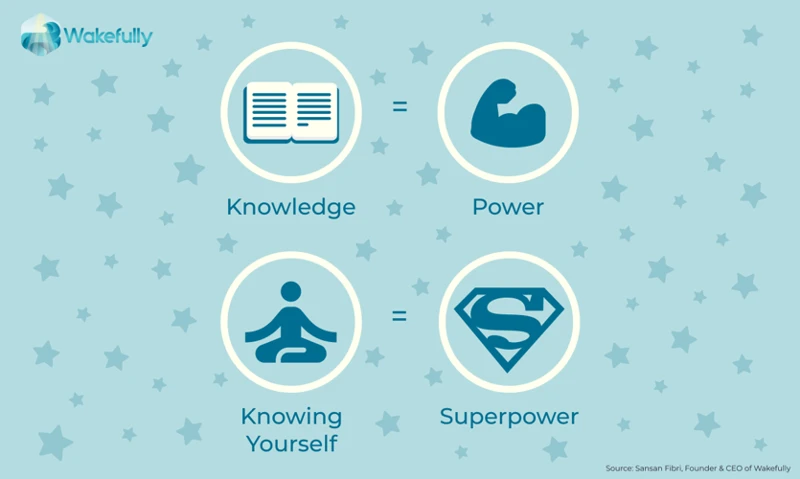Have you ever woken up from a dream feeling like there was something deeper, more profound that you couldn’t quite grasp? Dreaming is a mysterious and often perplexing aspect of our inner worlds. However, keeping a dream journal can be a powerful tool for unlocking the mysteries of our dreams and using them for spiritual growth. In this article, we’ll explore the definition and importance of dream journaling, as well as how to interpret the symbolism in your dreams and connect with your higher self. We’ll also offer tips for starting and maintaining an effective dream journaling practice and discuss the many benefits it can bring to your personal growth and spiritual journey.
What is Dream Journaling?

Dreams have long been a source of mystery and fascination for humans. Whether you have vivid, intense dreams every night or only remember fragments of them, each dream is a unique journey into your subconscious mind. One way to unlock the secrets of your dreams and use them for spiritual growth is through the practice of dream journaling. But what exactly is dream journaling? And why is it important for connecting with your inner self? Let’s take a deeper look at this powerful tool for self-discovery.
1. Definition
Dream journaling is the practice of recording your dreams in a journal or notebook upon waking up. It involves intentionally capturing the details of your dreams, including the people, places, emotions, and events that occurred while you slept. The purpose of dream journaling is to help you remember your dreams more clearly and to gain insight into your unconscious mind.
The act of writing down your dreams not only preserves them for later reflection, but it also reinforces the neural pathways associated with dream recall. By committing your dreams to paper, you are sending a signal to your brain that these experiences are important and worth remembering.
Dream journaling differs from traditional journaling in that it focuses solely on your dreams and their contents, rather than your thoughts and experiences from waking life. It provides a unique opportunity to explore the hidden aspects of yourself and tap into your inner wisdom. In the next section, we will discuss the reasons why dream journaling is important for spiritual growth.
| Pros | Cons |
|---|---|
| Helps remember dreams more clearly | Can be time-consuming |
| Allows for insight into unconscious mind | May be difficult to interpret dreams accurately |
| Helps strengthen neural pathways associated with dream recall | Can be challenging to stay consistent with journaling |
| Provides a unique opportunity for self-exploration and inner wisdom | May require vulnerability and going outside of one’s comfort zone |
Despite these potential drawbacks, dream journaling can offer powerful benefits for spiritual growth and personal development. In the following sections, we will explore how dream journaling can help you interpret the messages within your dreams, strengthen your spiritual connection, and facilitate personal growth and healing.
2. Importance of Keeping a Dream Journal
A dream journal is a powerful tool for gaining insight into the unconscious mind, and unlocking the mysteries of your dreams. Keeping a dream journal has great importance in spiritual growth, as it allows individuals to gain a deeper understanding of themselves and their spiritual path.
Here are some of the main reasons why keeping a dream journal is so important:
| 1. Remembering your dreams | Writing down your dreams as soon as you wake up helps you remember them better. If you don’t write down your dreams, you’ll likely forget them quickly. |
| 2. Identifying patterns | Recording your dreams over an extended period can help you identify recurring themes, symbols, and patterns that may have meaning or significance for you. |
| 3. Enhancing self-awareness | Keeping a dream journal helps you develop a better understanding of your thoughts, emotions, and attitudes, as well as gain insight into your personal and spiritual growth. |
| 4. Stimulating creativity | Writing down your dreams can boost your creativity, as dreams often contain novel and imaginative imagery, stories, and ideas that can inspire your artistic or creative pursuits. |
| 5. Building a relationship with your subconscious mind | By keeping a dream journal, you establish a relationship with your subconscious mind and begin to understand its language and symbolism. |
| 6. Developing intuition | Dream journaling enhances your intuitive abilities by helping you discern the deeper meaning and messages behind your dreams. |
In short, keeping a dream journal is essential for anyone seeking spiritual growth and personal transformation. It provides a wealth of insights, self-knowledge, and inspiration for those willing to engage with their dreams and explore the mysteries of the unconscious mind.
Dream Interpretation for Spiritual Growth

As we sleep, our imagination takes us into a world beyond the physical realm, full of symbols and messages that can offer guidance for our spiritual growth. However, understanding these symbols and messages can be perplexing. Dream interpretation is a powerful tool that can help unlock the mysteries of our dreams and reveal their deeper meaning. By reflecting on our dreams, we can gain insight into our subconscious mind and connect with our higher self. In this section, we will explore how dream interpretation can support our spiritual growth and offer guidance on how to apply the messages from our dreams to our waking life.
1. Understanding the Symbolism in Your Dreams
One of the most important aspects of dream journaling for spiritual growth is understanding the symbolism in your dreams. Dreams are full of metaphorical language and images that can provide valuable insight into our subconscious mind and inner world.
To begin interpreting your dreams, it is important to identify the different symbols that appear in your dreams. These can be people, objects, animals, or abstract concepts like emotions or colors.
One way to analyze the symbolism in your dreams is by creating a table with three columns: Symbol, Meaning, and Personal Association. In the Symbol column, list all of the different symbols that appeared in your dream. In the Meaning column, write down what each symbol represents. This can be determined by personal association or through a dream dictionary. In the Personal Association column, reflect on how each symbol relates to your own life and experiences.
Symbol | Meaning | Personal Association
— | — | —
Butterfly | Transformation, metamorphosis | I recently went through a big life change
Water | Emotion, subconscious | I have been feeling overwhelmed with emotions lately
Dog | Loyalty, companionship | I miss my childhood dog who passed away
Bridge | Transition, change | I am about to start a new job and I’m feeling nervous
By understanding the symbolism in your dreams, you can gain important insights into your subconscious mind and inner world. These symbols often represent deeper meanings and can be a guide for spiritual growth and personal development.
2. Applying the Messages to Your Life
Dreams often contain messages that can be applied to your waking life in a meaningful way. However, interpreting these messages and understanding how to apply them can be a challenging process. Here are some tips for effectively applying the messages from your dreams to your waking life:
1. Reflect on the emotions and symbols in your dreams: Emotions and symbols in dreams can offer valuable insight into your subconscious beliefs and desires. Reflect on the emotions and symbols in your dreams and explore how they relate to your waking life.
2. Consider the context of the dream: The context of the dream can also be helpful in understanding its messages. What was happening in the dream? Who was there? What was the overall atmosphere of the dream? Consider how these details might relate to your waking life.
3. Look for patterns: Patterns in your dreams can also offer insight into recurring themes or issues in your life. Look for common symbols or themes that appear in multiple dreams and consider how they might relate to your waking life.
4. Take action: Applying the messages of your dreams often involves taking action in your waking life. Consider what steps you can take to integrate the messages into your daily routine.
5. Trust your intuition: When applying the messages from your dreams, it’s important to trust your intuition. Your intuition can often guide you towards the most meaningful interpretation and course of action.
By reflecting on the emotions and symbols in your dreams, considering the context of the dream, looking for patterns, taking action, and trusting your intuition, you can effectively apply the messages from your dreams to your waking life in a way that promotes spiritual growth and personal development.
Strengthening Your Spiritual Connection through Dream Journaling

As we continue to explore the benefits of dream journaling, we come across a fascinating aspect that relates to strengthening our spiritual connection. Dreams have long been associated with spiritual experiences, and keeping a dream journal can help us tap into this realm of our consciousness. By recognizing patterns and connecting with our higher self, we open ourselves up to true spiritual growth and enlightenment. Let’s delve deeper into how dream journaling can aid us in this transformative journey.
1. Recognizing Patterns and Themes
One of the benefits of dream journaling is that it allows you to identify patterns and themes in your dreams, which can provide valuable insights into your life and spiritual growth. To effectively recognize these patterns, follow these steps:
- Read through your journal regularly: Set aside time to read through your dream journal on a regular basis. As you read through your entries, look for commonalities in the content or emotions expressed in your dreams.
- Identify recurring symbols: Pay attention to any symbols that appear frequently in your dreams. These symbols may hold special meaning for you and can offer insight into your subconscious.
- Look for connections to your waking life: Try to connect the themes and symbols in your dreams to events or situations in your waking life. Your dreams may be trying to communicate something important to you.
- Use your intuition: Trust your intuition when interpreting the patterns and themes in your dreams. Your subconscious is trying to communicate with you in a way that is unique to your own experiences and emotions.
By recognizing patterns and themes in your dreams, you can gain a deeper understanding of your innermost thoughts and feelings. This can help you to identify any recurring issues or challenges that you may be facing in your waking life, and can guide you towards personal growth and spiritual development.
2. Connecting with Your Higher Self
As you continue to record your dreams in your journal, you may notice that certain themes or symbols keep appearing. These patterns can be a sign that your higher self is trying to communicate with you. By paying attention to these recurring themes and symbols, you can begin to unravel the meanings behind them and connect with your higher self on a deeper level.
One way to facilitate this connection is to use a meditative practice in conjunction with your dream journaling. Before going to sleep at night, take some time to set an intention to connect with your higher self. You can do this through a simple meditation, where you focus on your breath and visualize a white light surrounding you. This can help you clear your mind and open yourself up to receiving messages from your higher self in your dreams.
Another technique to aid in connecting with your higher self is to practice mindfulness throughout your day. By staying present and aware of your surroundings, you may notice synchronicities or signs that help guide you towards your spiritual path. Documenting these experiences in your dream journal can help you gain a better understanding of the ways in which your higher self is trying to communicate with you.
Connecting with your higher self through dream journaling can be a powerful tool for spiritual growth and self-discovery. By cultivating a consistent practice of recording your dreams and exploring their deeper meanings, you can gain a greater sense of clarity and purpose in your life.
How to Start Your Dream Journal

If you’re new to dream journaling, you might be wondering where to begin. Starting a dream journal can be an exciting adventure, but it can also feel overwhelming. You may feel perplexed about what to include and where to start. However, with the right intentions and approach, you can begin recording and interpreting your dreams in a way that is meaningful to you. In this section, we will guide you through the process step by step, highlighting the key aspects of starting and maintaining a dream journal that supports spiritual growth.
1. Setting an Intention
Setting an intention for your dream journaling practice is essential for unlocking the mysteries of your dreams and using them for spiritual growth. Here are some steps you can follow when setting your intention:
- Reflect on Your Goals: Before you start journaling your dreams, take some time to reflect on what you hope to achieve through the practice. Are you looking to gain spiritual insights? To overcome certain fears or anxieties? To develop your intuition? Understanding your goals will help you channel your focus and energy more effectively.
- Word Your Intention Carefully: Once you’ve identified your goals, take care to phrase your intention in a way that is clear, specific, and positive. For instance, instead of simply saying “I want to remember my dreams,” you might say “I am open and receptive to the messages of my dreams, and I remember them clearly and vividly.”
- Create a Visual Reminder: To help reinforce your intention, you can create a visual reminder to keep in your bedroom or on your bedside table. This could be a picture or symbol that represents your intention, or even just a Post-it note with a few key words or phrases.
- Repeat Your Intention Before Bed: As you settle into bed, take a moment to repeat your intention to yourself silently or aloud. This helps to solidify your commitment to your practice and will signal to your subconscious mind that you are open and receptive to your dreams.
Setting an intention for your dream journaling practice is a powerful way to focus your attention, gain clarity, and deepen your spiritual connection. By following these steps, you can set yourself up for success and begin unlocking the hidden wisdom of your dreams.
2. Creating a Ritual
Creating a ritual around dream journaling can greatly enhance your experience and help you to develop a deeper connection with your dreams. Here are some steps you can take to create a dream journaling ritual:
- Choose a special notebook: Select a notebook that you will use solely for recording your dreams. It can be a beautiful journal or something plain and simple- it is up to you!
- Place your journal in a special spot: Choose a dedicated spot for your dream journal, somewhere that feels sacred and special to you.
- Prepare yourself for bed: Take some time to wind down before going to bed. You might take a relaxing bath, practice some gentle yoga, or meditate. Whatever helps you to relax and prepare for sleep.
- Set an intention: Before falling asleep, set an intention to remember your dreams. You might say something like, “I am open to receiving the messages of my dreams” or “I am ready to explore the depths of my subconscious.”
- Use a meditation or visualization: As you drift off to sleep, you might choose to listen to a guided meditation or visualize yourself diving deep into your subconscious mind.
- Record your dreams immediately upon waking: As soon as you wake up, grab your dream journal and record as much detail about your dream as possible. Write down any emotions, sensations, and symbols that stand out to you.
- Reflect on your dreams: Take some time to read over your dream journal entries and reflect on their meaning. Look for patterns and themes that might be emerging.
Creating a ritual around dream journaling can help to signal to your subconscious mind that you are taking your dreams seriously and can help to encourage greater dream recall. Experiment with different rituals and see what works best for you!
3. Recording Your Dream
After setting an intention and creating a ritual, the next step in dream journaling is recording your dream. This is an essential step because, without a written record, we tend to forget our dreams quickly. Here are some tips for recording your dream:
- Write it down: As soon as you wake up, grab a pen and paper, or use a note-taking app on your phone to write down everything you can remember about your dream.
- Be as detailed as possible: Write down as many details as you can recall even if they seem insignificant. You never know which detail might be important in understanding the message of your dream.
- Use the present tense: When writing down your dream, use present tense as it helps you to fully immerse yourself in the dream and also enhances recall.
- Include emotions and sensations: Record how you felt in the dream and any physical sensations you experienced. Emotions and physical sensations are usually key indicators of the message behind the dream.
- Draw: If you are more visually oriented, consider drawing pictures or diagrams to represent the images in your dream. This can also help you recall details later.
Remember, there is no right or wrong way to record your dream. The important thing is to record as much as you can remember and capture the essence of your dream. By doing so, you will be able to reflect and analyze the messages in your dream and apply them to your spiritual growth.
4. Reflecting on Your Dream’s Meaning
After recording your dream, take some time to reflect on its meaning. This step is crucial for unlocking the mysteries of your dreams and using them for spiritual growth. Here are some ways to reflect on your dream’s meaning:
- Identify key symbols: Think about the people, objects, and actions that stood out in your dream. What do they represent to you?
- Consider your emotions: Reflect on how you felt during the dream and after waking up. What emotions were present? Did anything trigger those emotions?
- Explore possible interpretations: Think about what the symbols in your dream could mean. Look up dream symbolism online or in a dream dictionary for additional insight.
- Connect to your waking life: Consider how the themes and symbols in your dream relate to your current waking life. Is there something you need to address or let go of? What action can you take to facilitate growth in this area?
- Write down your insights: Keep a separate section in your dream journal for insights and interpretations. This will help you track your progress and connect the dots between your dreams and your waking life.
Reflecting on your dream’s meaning can feel overwhelming at first, but with practice, it can become a meaningful and insightful part of your spiritual journey. Remember to approach your dreams with curiosity and an open mind, and trust that the messages they hold are there to support your growth and evolution.
Tips for Effective Dream Journaling

Recording your dreams in a journal can be an incredibly effective tool for spiritual growth and self-discovery. However, it can be challenging to remember all the details of your dream and effectively capture its essence in your journal. To assist you in your dream journaling journey, we have compiled a list of tips to enhance your dream journaling experience. These tips will help you to remember your dreams more vividly, understand their symbolism and meaning, and ultimately connect with your soul’s deepest desires.
1. Taking Notes as Soon as You Wake Up
One of the most important aspects of dream journaling is taking notes as soon as you wake up. This means that as soon as you open your eyes, you should try to remember as much as you can about your dream. It’s important to do this before you start thinking about anything else or checking your phone. To make the process easier, try keeping a notebook and pen or your phone nearby your bed.
Here are some tips for taking notes as soon as you wake up:
| Tips | Description |
|---|---|
| Stay in bed for a few minutes | As you wake up, try to stay in bed for a few minutes and focus on your dream. This will help you remember more details. |
| Write down keywords | You don’t have to write down everything you remember. Instead, focus on writing down keywords that will jog your memory later, such as people, places, and emotions. |
| Record in present tense | When writing about your dream, use the present tense. This will help you remember the details more vividly and make it easier to interpret the dream later. |
| Don’t worry about grammar | When taking notes, don’t worry about spelling or grammar. The goal is to capture as much information as you can. |
| Use sensory descriptions | Try to include sensory descriptions in your notes, such as smells, tastes, and textures. This will help you remember the dream more vividly later on. |
By taking notes as soon as you wake up, you’ll be able to remember more details and capture the essence of your dream. This will make it easier to interpret your dreams and use them for spiritual growth. So, make it a habit to keep a notebook or your phone nearby and jot down your dreams as soon as you wake up.
2. Being Consistent
Consistency is key when it comes to dream journaling. It’s important to make it a habit and to do it regularly to see the benefits. Here are some tips for staying consistent:
- Set a schedule: Choose a time that works best for you to write in your dream journal, and make it a non-negotiable part of your routine. Whether it’s first thing in the morning or right before bed, creating a consistent schedule can make it easier to stick with the habit.
- Make it a priority: Treat dream journaling as a priority rather than an afterthought. Remind yourself of the benefits and why it’s important to your spiritual growth.
- Eliminate distractions: When you’re writing in your dream journal, eliminate any potential distractions. Find a quiet space where you can focus solely on the task at hand.
- Keep it simple: Don’t put too much pressure on yourself to write extensively or create elaborate entries. Keep it simple and focus on recording the key details of the dream.
- Be forgiving: Don’t get discouraged if you miss a day or two of journaling. Forgive yourself and get back on track as soon as possible. Remember, the goal is progress, not perfection.
Consistency is essential to unlocking the mysteries of your dreams and gaining spiritual growth. By making dream journaling a regular habit, you can reap the benefits and deepen your understanding of yourself and your spirituality.
3. Using Prompts to Stimulate Recall
Using prompts is a great way to stimulate recall and remember your dreams more vividly. These prompts can act as triggers to help you recall details about your dreams and bring them to the forefront of your mind. Here are some examples of prompts you can use:
| Prompt | Description |
|---|---|
| What emotions did you experience in the dream? | Feelings can be powerful prompts and can help you recall important details about your dream. |
| What colors did you see? | Colors can have symbolic meanings and can help you uncover hidden messages in your dreams. |
| Were there any recurring symbols or themes? | Recurring symbols or themes can indicate patterns in your dreams and can help you understand what your subconscious is trying to communicate. |
| What did you hear? | Music, voices, and sounds can all be important prompts and can help you remember more details about your dream. |
| Did you interact with anyone? | Interactions with people or animals in your dreams can be significant and can help you understand your relationships and emotions in waking life. |
These prompts can be used before going to bed to set your intention for the night’s dreaming, or after waking up to help you remember your dreams more clearly. Experiment with using different prompts and see which ones work best for you. Using prompts can help you unlock the mysteries of your dreams and use them for spiritual growth and personal transformation.
4. Paying Attention to Emotions and Sensations
When recording your dreams in your journal, it’s important to pay attention to the emotions and sensations you experienced during the dream. The emotions that come up in our dreams can often reflect our deepest fears, desires, and unresolved issues. Recording these emotions can help us identify patterns and themes in our dreams, ultimately leading to a better understanding of ourselves.
Similarly, paying attention to our sensations can also provide valuable insights. For example, did you feel hot or cold? Were you tense or relaxed? These physical sensations can give us clues as to what our subconscious is trying to tell us.
To effectively record emotions and sensations in your dream journal, consider using a list format. Make note of the specific emotions or sensations you experienced, and try to identify any patterns or recurring themes.
For example, you may write something like:
– Emotions: fear, confusion, excitement
– Sensations: rapid heartbeat, sudden temperature change
By taking the time to analyze and record these aspects of your dreams, you can gain a better understanding of yourself and your subconscious. This can ultimately lead to personal growth and spiritual development.
The Benefits of Dream Journaling for Spiritual Growth
As we delve deeper into the practice of dream journaling, we uncover not only the mystical nature of our dreams but also the potential they hold for our spiritual growth. The act of keeping a dream journal not only helps us understand the symbolic nature of our dreams, but also unlocks the many benefits they hold for our inner development. In this section, we explore these benefits and discover how they can lead to a deeper understanding of ourselves, our spirituality, and our place in the world. So, let us discover the ways in which dream journaling can bring about transformation and healing in our lives.
1. Increased Self-Awareness
By keeping a dream journal, you can experience several benefits for your spiritual growth. One of the most significant advantages is increased self-awareness.
When you write down your dreams regularly, it helps you become more conscious of your thoughts, emotions, and behavioral patterns. As you reflect on your dreams’ content, you get a unique insight into your psyche and the hidden aspects of your personality.
You might find yourself uncovering suppressed feelings or memories that you haven’t recognized before. This process helps you develop a deeper understanding of yourself and your innermost desires, leading to greater self-awareness and acceptance.
Additionally, keeping a dream journal also helps you identify reoccurring themes or symbols that appear across multiple dreams. These patterns can reflect the challenges or lessons you need to address in your waking life.
By understanding your dreams’ symbolism and identifying themes, you can make more informed and conscious decisions in your daily life. This self-awareness is crucial for spiritual growth since it allows you to identify and work through any obstacles that prevent you from being your best self.
2. Deeper Spiritual Connection
One of the significant benefits of dream journaling is the possibility of achieving a deeper spiritual connection. Dreaming is a natural process that occurs while the conscious mind rests. During this period, the subconscious mind takes over, and this is where the dreams occur. The subconscious mind is believed to be closely linked to spirituality, and it is where our intuition and inner wisdom reside.
By keeping a dream journal, we are opening up ourselves to this inner knowledge and strengthening our spiritual connection. Our dreams can reveal insights about ourselves and the world around us that we may not be aware of consciously, including our spiritual path and purpose.
The following table outlines some ways in which dream journaling can help us achieve a deeper spiritual connection:
| Benefits of Dream Journaling for Spiritual Connection | How it Helps |
|---|---|
| Increased self-awareness | Through recording, interpreting, and reflecting on our dreams, we can gain a better understanding of ourselves, our beliefs, and our values |
| Opportunity to connect with our higher selves | Our higher selves – the part of us connected to the divine – can communicate with us through our dreams. By paying attention to our dreams, we can receive spiritual guidance and deepen our connection to our true selves |
| Helps us to identify our purpose and path | By interpreting our dreams, we can often gain insights into our purpose and path. Dreams can reveal our fears and desires, helping us to live a more authentic, fulfilling life that aligns with our core values and beliefs |
Dream journaling can be an empowering tool for those looking to deepen their spiritual connection. By recording our dreams and exploring their meaning, we can gain valuable insights that can help us to live a more purposeful, fulfilling life.
3. Personal Growth and Healing
Dream journaling can also offer several benefits for personal growth and healing. By writing down and reflecting on your dreams, you can gain insight into your thoughts, feelings, and experiences. This can lead to a better understanding of yourself and the issues that may be affecting you.
Some ways in which dream journaling can promote personal growth and healing include:
- Identifying patterns and triggers: Keeping track of your dreams over an extended period can help you identify patterns and recurring themes. These patterns and themes may offer clues to underlying issues or triggers that are affecting your well-being.
- Processing emotions: Dreams can be a powerful way to process and work through emotions. By recording and reflecting on your dreams, you can gain insight into the emotions that may be driving your thoughts and behaviors.
- Exploring inner conflicts: Dreams can also shed light on inner conflicts or dilemmas that you may be facing. By analyzing and interpreting your dreams, you may be able to gain clarity on these conflicts and find ways to resolve them.
- Encouraging creativity: Dreams can be a source of inspiration and creativity. By recording and exploring your dreams, you may be able to tap into your creativity and gain new insights into your artistic pursuits or hobbies.
- Reducing stress: Writing down your dreams can be a form of self-care and stress relief. By taking time to reflect on your dreams, you may be able to reduce feelings of stress or anxiety and improve your overall sense of well-being.
Dream journaling can be a powerful tool for personal growth and healing. By taking the time to record and reflect on your dreams, you may be able to gain insight into yourself and find new ways to improve your life.
Conclusion
As we’ve explored the practice of dream journaling for spiritual growth, it’s clear that this powerful tool can unlock the mysteries of our subconscious and connect us with our higher self. By recording our dreams and reflecting on their messages, we can gain greater insight into our lives and relationships, and even experience personal growth and healing.
Through dream interpretation, we can begin to understand the symbolism in our dreams and apply the messages to our waking life. We can recognize patterns and themes, connecting with our higher self and strengthening our spiritual connection.
Starting a dream journal can feel intimidating, but by setting an intention, creating a ritual, and consistently recording and reflecting on our dreams, we can make this a powerful and transformative habit. By paying attention to our emotions and sensations and using prompts to stimulate recall, we can deepen our connection to our inner world and experience the benefits of increased self-awareness and personal growth.
Overall, dream journaling is a valuable tool for those seeking spiritual growth and healing. By unlocking the mysteries of our dreams and connecting with our higher self, we can gain greater insight into our lives and relationships and experience a deeper sense of peace and fulfillment. So, if you’re ready to start your own dream journaling practice, set your intention and dive in – the journey is sure to be a rewarding one.
Frequently Asked Questions
1. Can dream journaling help me remember my dreams better?
Yes, the act of writing down your dreams soon after waking can help you remember them better.
2. Why is it important to reflect on the meaning of my dreams?
Reflecting on your dreams can help you better understand your subconscious thoughts and feelings, and how they may be impacting your waking life.
3. How can I differentiate between a dream that is just random and one that has spiritual significance?
Look for recurring symbols or themes, as well as any strong emotions or sensations in the dream, as they may indicate a deeper spiritual message.
4. Is it necessary to have a specific spiritual belief in order to benefit from dream journaling?
No, regardless of your beliefs or religion, dream journaling can help you connect with your subconscious and gain insights into your personal growth and development.
5. Can dream journaling be used for therapy?
Yes, dream journaling is often used as a tool in therapy to help uncover and process personal issues or traumas.
6. What can I do if my dreams are often disturbing or negative?
Try to view these dreams as an opportunity for growth and self-exploration, and consider discussing them with a therapist or spiritual advisor.
7. Can lucid dreaming be incorporated into dream journaling?
Yes, practicing lucid dreaming can help you explore your subconscious more deeply and gain a greater understanding of your spiritual path.
8. How often should I write in my dream journal?
As often as possible, ideally every morning after waking up so that you can capture the most details about your dreams.
9. Can I use my phone or computer to record my dreams?
While it is possible, it is often more effective to use a pen and paper to write down your dreams, as the physical act of writing can help further cement the details in your memory.
10. What if I can’t remember anything from my dreams?
Try setting the intention before sleeping to remember your dreams, and consider using prompts or visualization techniques to help stimulate dream recall.








